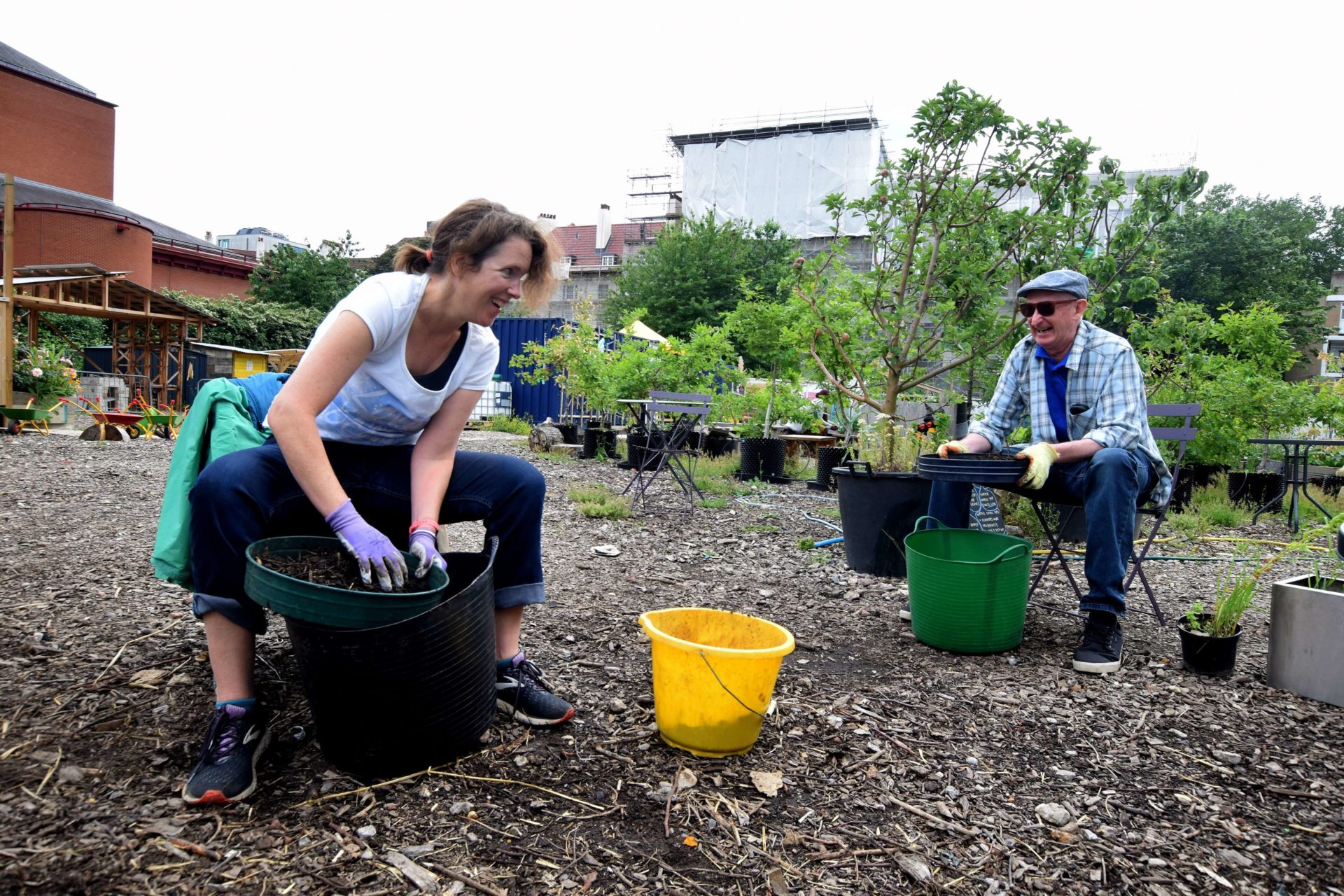Educational charity Global Generation have been creating community gardens and popups in Camden since 2009 and established their Story Garden in 2019. Based behind the British Library in Somers Town, it hosts community workshops, collaborative projects, and the garden itself has come about through community volunteering. The Story Garden was nominated for recognition by residents for providing ‘access to nature, gardening opportunities and outdoor activities during the pandemic’.
We spoke with Nicole Van den Eijnde, Global Generation’s Director and Malaika Bain-Peachey, Community Gardener, about their experiences.
What has been Global Generation’s role in the pandemic and what inspired you to get involved?
Nicole: We strongly felt that the garden should stay open during the pandemic so that local people could have a safe outdoor space to use, and be able to connect with nature. We also quickly adapted how we run our programmes. We created stay-at-home garden packs with seed packets and activities people could do from their homes while still feeling a connection with nature.
We continued our programmes online so that people could connect with each other even when they couldn’t meet. As soon as it was possible, we brought people back into the garden because we knew how important it was for people’s wellbeing.
Malaika: It became clear during the first lockdown that there was a need for fresh produce in the community. We teamed up with the Camden Mobile Food Bank, part of Urban Community Projects, stepped up our growing spaces and production to grow vegetables as quickly as possible to donate to the food bank.

What challenges has Global Generation and the Story Garden faced?
Malaika: We really had to deliver at a time when people from our organisation also had to be furloughed. We had to zero in on our collective strengths, concentrating on supporting people with activities to do from home growing produce and opening the garden when it was possible. It involved upskilling ourselves and adapting quickly.
Nicole: It was difficult doing lots of this work at a time when our team couldn’t get together in person, but I feel proud of how we switched to doing things online, navigating through guidelines, and looking after people’s health and wellbeing.
“I’ve learned so much more about what we do and can do as an organisation”
Malaika Bain-Peachey, Community Gardener
What’s your most memorable moment from your activities supporting Camden communities during the pandemic?
Nicole: I will remember all the moments when people have come back to the garden, and the events and celebrations we’ve been able to hold during this past year, like an Eid party and a community lunch. The moments when people have come together and shared a lighter moment amidst everything.
Malaika: The first time our whole team got back together for a team away day after everything we had done during lockdown. It was a chance to reflect on how much work each person had put in and how far we’ve come. It felt like we could collectively sigh and celebrate our perseverance.
What is the main thing you have learned from the pandemic period?
Nicole: I’ve learned that we all have to navigate uncertainty in our lives, and instead of being paralysed by this, we can collaborate and support each other to get through it. It’s also been an opportunity to pause and reflect, and think differently and creatively.
Malaika: I feel similarly – it’s been a time to embrace uncertainty rather than fight it. I’ve learned so much more about what we do and can do as an organisation, how we can work together with and best represent our local community and be a part of change through environmental education.
What are your hopes for the future?
Nicole: Our garden sites are temporary until the land gets built on, so we’re proactively working with others to ensure that there is a longer legacy for the Story Garden. We want to work with residents around more greening in the local area, and encouraging more food growing.
Malaika: I hope that we can get to the bottom of issues around food poverty and environmental injustice, rather than just tackling emergency needs. We need long-term solutions.
What one change would make the greatest difference for Camden as we come out of the pandemic?
Malaika: I want to see growing compassion and empathy to strengthen communities. I want to carry the same energy of helping each other out that we did in the first wave of the pandemic into the future. Not as a result of a calamity, but as an intention to support and bond with our neighbours, businesses, schools and organisations working together.
Nicole: When the world stopped, we heard the birds more and there was less pollution. We need to not lose sight of climate change and climate action, and it needs to be something that runs through all the changes taking place – not a separate thing, but sitting intersecting with other issues and solutions.
Is there an organisation or group you would like to see recognised for their support for people in Camden during this time?
Malaika: Hopscotch is an organisation doing great work to support women, including around domestic violence and employability.
Nicole: Camden Mobile Food Bank, run by Urban Community Projects, and Somers Town Community Association have been great to work with.
How can people get involved with Global Generation’s Story Garden?
People can come and enjoy the garden from Tuesday to Saturday, 10am to 4pm.
Visit the Global Generation website for details of weekly activities and how to volunteer or donate.
Photo credits: Global Generation
